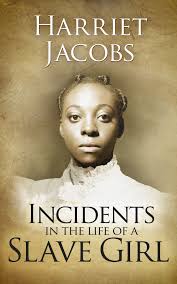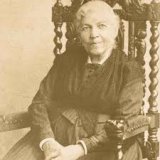Incidents in the Life of a Slave Girl Page #27
Incidents in the Life of a Slave Girl, written by herself is an autobiography by Harriet Jacobs, a mother and fugitive slave, published in 1861 by L. Maria Child, who edited the book for its author. Jacobs used the pseudonym Linda Brent.
On the decisive day the doctor came, and said he hoped I had made a wise choice. "I am ready to go to the plantation, sir," I replied. "Have you thought how important your decision is to your children?" said he. I told him I had. "Very well. Go to the plantation, and my curse go with you," he replied. "Your boy shall be put to work, and he shall soon be sold; and your girl shall be raised for the purpose of selling well. Go your own ways!" He left the room with curses, not to be repeated. As I stood rooted to the spot, my grandmother came and said, "Linda, child, what did you tell him?" I answered that I was going to the plantation. "Must you go?" said she. "Can't something be done to stop it?" I told her it was useless to try; but she begged me not to give up. She said she would go to the doctor, and remind him how long and how faithfully she had served in the family, and how she had taken her own baby from her breast to nourish his wife. She would tell him I had been out of the family so long they would not miss me; that she would pay them for my time, and the money would procure a woman who had more strength for the situation than I had. I begged her not to go; but she persisted in saying, "He will listen to me, Linda." She went, and was treated as I expected. He coolly listened to what she said, but denied her request. He told her that what he did was for my good, that my feelings were entirely above my situation, and that on the plantation I would receive treatment that was suitable to my behavior. My grandmother was much cast down. I had my secret hopes; but I must fight my battle alone. I had a woman's pride, and a mother's love for my children; and I resolved that out of the darkness of this hour a brighter dawn should rise for them. My master had power and law on his side; I had a determined will. There is might in each. XVI. Scenes At The Plantation. Early the next morning I left my grandmother's with my youngest child. My boy was ill, and I left him behind. I had many sad thoughts as the old wagon jolted on. Hitherto, I had suffered alone; now, my little one was to be treated as a slave. As we drew near the great house, I thought of the time when I was formerly sent there out of revenge. I wondered for what purpose I was now sent. I could not tell. I resolved to obey orders so far as duty required; but within myself, I determined to make my stay as short as possible. Mr. Flint was waiting to receive us, and told me to follow him up stairs to receive orders for the day. My little Ellen was left below in the kitchen. It was a change for her, who had always been so carefully tended. My young master said she might amuse herself in the yard. This was kind of him, since the child was hateful to his sight. My task was to fit up the house for the reception of the bride. In the midst of sheets, tablecloths, towels, drapery, and carpeting, my head was as busy planning, as were my fingers with the needle. At noon I was allowed to go to Ellen. She had sobbed herself to sleep. I heard Mr. Flint say to a neighbor, "I've got her down here, and I'll soon take the town notions out of her head. My father is partly to blame for her nonsense. He ought to have broke her in long ago." The remark was made within my hearing, and it would have been quite as manly to have made it to my face. He had said things to my face which might, or might not, have surprised his neighbor if he had known of them. He was "a chip of the old block." I resolved to give him no cause to accuse me of being too much of a lady, so far as work was concerned. I worked day and night, with wretchedness before me. When I lay down beside my child, I felt how much easier it would be to see her die than to see her master beat her about, as I daily saw him beat other little ones. The spirit of the mothers was so crushed by the lash, that they stood by, without courage to remonstrate. How much more must I suffer, before I should be "broke in" to that degree? I wished to appear as contented as possible. Sometimes I had an opportunity to send a few lines home; and this brought up recollections that made it difficult, for a time, to seem calm and indifferent to my lot. Notwithstanding my efforts, I saw that Mr. Flint regarded me with a suspicious eye. Ellen broke down under the trials of her new life. Separated from me, with no one to look after her, she wandered about, and in a few days cried herself sick. One day, she sat under the window where I was at work, crying that weary cry which makes a mother's heart bleed. I was obliged to steel myself to bear it. After a while it ceased. I looked out, and she was gone. As it was near noon, I ventured to go down in search of her. The great house was raised two feet above the ground. I looked under it, and saw her about midway, fast asleep. I crept under and drew her out. As I held her in my arms, I thought how well it would be for her if she never waked up; and I uttered my thought aloud. I was startled to hear some one say, "Did you speak to me?" I looked up, and saw Mr. Flint standing beside me. He said nothing further, but turned, frowning, away. That night he sent Ellen a biscuit and a cup of sweetened milk. This generosity surprised me. I learned afterwards, that in the afternoon he had killed a large snake, which crept from under the house; and I supposed that incident had prompted his unusual kindness. The next morning the old cart was loaded with shingles for town. I put Ellen into it, and sent her to her grandmother. Mr. Flint said I ought to have asked his permission. I told him the child was sick, and required attention which I had no time to give. He let it pass; for he was aware that I had accomplished much work in a little time. I had been three weeks on the plantation, when I planned a visit home. It must be at night, after every body was in bed. I was six miles from town, and the road was very dreary. I was to go with a young man, who, I knew, often stole to town to see his mother. One night, when all was quiet, we started. Fear gave speed to our steps, and we were not long in performing the journey. I arrived at my grandmother's. Her bed room was on the first floor, and the window was open, the weather being warm. I spoke to her and she awoke. She let me in and closed the window, lest some late passer-by should see me. A light was brought, and the whole household gathered round me, some smiling and some crying. I went to look at my children, and thanked God for their happy sleep. The tears fell as I leaned over them. As I moved to leave, Benny stirred. I turned back, and whispered, "Mother is here." After digging at his eyes with his little fist, they opened, and he sat up in bed, looking at me curiously. Having satisfied himself that it was I, he exclaimed, "O mother! you ain't dad, are you? They didn't cut off your head at the plantation, did they?"
Translation
Translate and read this book in other languages:
Select another language:
- - Select -
- 简体中文 (Chinese - Simplified)
- 繁體中文 (Chinese - Traditional)
- Español (Spanish)
- Esperanto (Esperanto)
- 日本語 (Japanese)
- Português (Portuguese)
- Deutsch (German)
- العربية (Arabic)
- Français (French)
- Русский (Russian)
- ಕನ್ನಡ (Kannada)
- 한국어 (Korean)
- עברית (Hebrew)
- Gaeilge (Irish)
- Українська (Ukrainian)
- اردو (Urdu)
- Magyar (Hungarian)
- मानक हिन्दी (Hindi)
- Indonesia (Indonesian)
- Italiano (Italian)
- தமிழ் (Tamil)
- Türkçe (Turkish)
- తెలుగు (Telugu)
- ภาษาไทย (Thai)
- Tiếng Việt (Vietnamese)
- Čeština (Czech)
- Polski (Polish)
- Bahasa Indonesia (Indonesian)
- Românește (Romanian)
- Nederlands (Dutch)
- Ελληνικά (Greek)
- Latinum (Latin)
- Svenska (Swedish)
- Dansk (Danish)
- Suomi (Finnish)
- فارسی (Persian)
- ייִדיש (Yiddish)
- հայերեն (Armenian)
- Norsk (Norwegian)
- English (English)
Citation
Use the citation below to add this book to your bibliography:
Style:MLAChicagoAPA
"Incidents in the Life of a Slave Girl Books." Literature.com. STANDS4 LLC, 2025. Web. 26 Feb. 2025. <https://www.literature.com/book/incidents_in_the_life_of_a_slave_girl_947>.








Discuss this Incidents in the Life of a Slave Girl book with the community:
Report Comment
We're doing our best to make sure our content is useful, accurate and safe.
If by any chance you spot an inappropriate comment while navigating through our website please use this form to let us know, and we'll take care of it shortly.
Attachment
You need to be logged in to favorite.
Log In